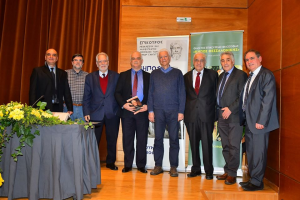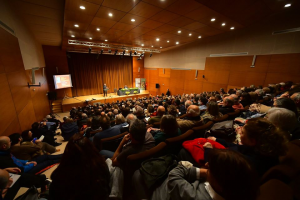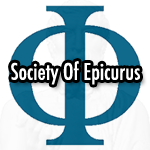My Epicurean friends
I hope you are well, despite the Ukrainian crisis and related humanitarian misery that Putin’s sociopathy has caused. As we Epicureans know well, it is Putin’s great fear of death that has created all that lust for power, money and cynical display of force against his adversaries. I hope we are not witnessing what our forefathers witnessed 83 years ago when Hitler’s sociopathy was in action.
Anyway, I am sending you the report on the 12th Panhellenic Symposium of Epicurean Philosophy, as promised. You may use it as you wish.
With Epicurean friendship
Christos
Report
12th Panhellenic Symposium of Epicurean Philosophy
19-20 February 2022
Co-organization: Friends of Epicurean Philosophy “Garden of Athens” and “Garden of Thessaloniki” – Municipality of Pallini
Internet Broadcast on YouTube and Facebook
Information: www.epicuros.gr
The philosophical psychotherapy of Epicurus in our time
In today’s Greece of the pandemic of the coronavirus and the ongoing psychological pressure, the 12th Panhellenic Symposium of Epicurean Philosophy was held online. The Panhellenic Symposium on Epicurean Philosophy is the largest annual philosophical conference held in Greece and at the same time the only conference on Epicurean Philosophy held annually in the world.
The Panhellenic Symposium of Epicurean Philosophy has been organized for twelve consecutive years. During the decade 2011-2020, it was attended every year by 300-500 delegates at the Cultural Center of Gerakas, in ancient deme of Gargittos (Gargettus), the place of origin of the philosopher Epicurus’ family. Last year and this year, due to the pandemic, the Panhellenic Symposium was watched online by more than 1000 people via broadcast on Facebook and Youtube.
The Mayor of Pallini Athanasios Zoutsos launched the beginning of the Symposium, which was greeted by friends of Epicurean philosophy from Greece, Cyprus, Italy, USA and Australia. On the first day, professors of the National Kapodistrian University of Athens George Chrousos and Christos Yapijakis (School of Medicine) and Vangelis Protopapadakis (Department of Philosophy) discussed topics related to the Epicurean philosophical medicines for mental health and stress management. Furthermore, some of the most interesting presentations regarding the Epicurean approach to modern era issues included the original study of an ancient papyrus of the Epicurean philosopher Philodemus by the philologist Dr. Eleni Avdoulou, the description of the senses by Epicurus which has a great correspondence with that of modern neurobiology by the phycisist Giannis Alexakis, the similarities of the Aristotelian and the Epicurean approach on friendship by the philologist Dr. Elsa Nikolaidou, the Epicurean way of thinking as a means to tackle problems in the modern rapidly changing world by the informaticist Takis Panagiotopoulos, as well as the proposed Epicurean simple sufficiency coupled with a reduction of the economy by the economist Nikos Graikousis.
On the second day, there was an emphasis on wide spreading of Epicurean philosophy in Roman era, which has much in common with modern multicultural Western societies. Some of the some of the most interesting presented topics included the Epicurean poet Lucretius by the Academician and Professor of Latin Philology of the Aristotle University of Thessaloniki Theodore Papanghelis, the philosopher Philodemus by the pharmacist Litsa Pitsikalis, the Epicurean writer Lucian from the Thyrathen publicer Giannis Avramidis, as well as Cicero’s works as source of Epicurean philosophy by the civil engineer Leonidas Alexandridis.
Furthermore, the Epicurean methodology of Canon as a tool for solving everyday problems was presented by the legal-private employee Dimitris Liarmakopoulos and the Epicurean approach in recognizing fake news on the internet was discussed by the economist and founding member of ellinikahoaxes.gr George Giotis and the lawyer Antonis Bilisis.
In addition, this year for the first time in the Panhellenic Symposium of Epicurean Philosophy there was an International Section in English with renown friends of Epicurus from Europe (Greece and Italy), USA and Australia. Christos Yapijakis, professor of Genetics at the School of Medicine of the National Kapodistrian University of Athens and founding member of the “Garden of Athens” (Greece) referred to the “Scientific Humanism of Epicurus” as the best way of thinking and acting for humanity in our difficult current times and then led the discussion with the International and Greek delegates. Hiram Crespo, author-blogger and founder of the Society of Friends of Epicurus (Chicago, USA) with the assistance of his collaborators/friends presented “Society of Friends of Epicurus: a Philosophical Community”. Geoff Petersson, lawyer-blogger and founder of the “Garden of Sydney” (Australia) presented “Comments on the Four-Part Cure from Downunder”. Cassius Amicus, lawyer- author-blogger and founder of Newepicurean.com (Atlanta, USA) discussed “An Epicurean Response to Plato’s Attack on Pleasure”. Last but not least, Michele Pinto, journalist-blogger, president of World of Epicurus/Mondo di Epicuro (Senigallia, Italy) in his presentation “Epicurus, philosophy and optimism” suggested that it is advisable to follow Epicurus’ advice and make each day better than the previous one. In the discussion that followed experiences in individual countries were shared as well as the best Epicurean publications in different languages.
The artistic program of the Panhellenic Symposium featured the dramatic reading of the poem “Triumph” by Kostis Palamas by the actor Gerasimos Gennatas. The poem refers to the cultural triumph achieved by the Roman Epicurean Lucretius with his majestic and timeless poem “On the nature of things” and the huge difference it had with the triumphs of his contemporary plundering generals of Rome.
For the twelfth consecutive year, the opportunity was openly given to the public to experience the scientific humanism of Epicurus’ philosophy, which offers a timeless mental shield against the universal psychological, social and cultural gridlocks, facilitating the pursue of a happy life in the simplest and most natural way, with wisdom, friendship and solidarity, even in difficult times.
You can watch the videotaped Symposium at: www.epicuros.gr
Dr. Christos Yapijakis, DMD, MS, PhD





